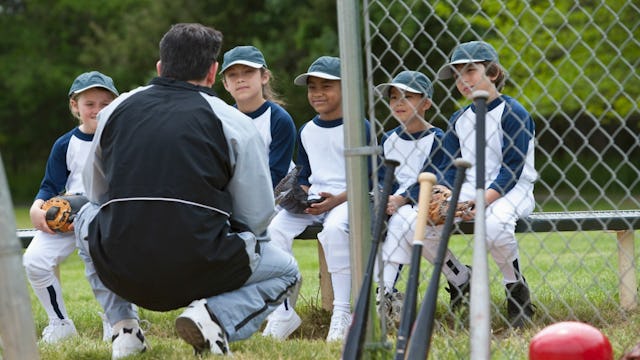What You Need To Remember About Your Kid's Coach

I watched nervously as my daughter bounced the basketball a few times at the free throw line during her basketball game.
Though she’s 12, she has only been playing for a year. We were late to jump on the organized sports bandwagon and, as such, she’s had a steep learning curve as she’s learned the rules of the game.
As she bounced the ball, I held my breath because I knew how hard it was for her to have everyone’s eyes on her. She’s never enjoyed the spotlight, and she had confided that she sometimes avoids plays that would result in a foul simply because she doesn’t want to have to shoot in front of an audience.
From the sidelines, I heard her coach yell, “It’s okay, we practiced this. You’ve got this. Focus, you’ll do it, I know it!”
Though she missed the basket, she turned and looked at her coach with a smile and gave him a thumbs up.
And then she looked at me in the stands, shrugged her shoulders and hustled back into the play of the game.
A year ago, she cried on her way to basketball tryouts because she was terrified that the other girls would trample her or make her feel embarrassed because she didn’t know how to play a structured game of basketball. When we arrived, a friend’s husband who was the commissioner of our league smiled kindly at her, told her some silly jokes and introduced her to a few girls in order to help her get over her nervous anxiety.
Once we were assigned a team, her new coach realized quickly that my daughter was timid and nervous. And he spent practice after practice patiently encouraging her, teaching her, correcting her stance and doing whatever it took to make her feel empowered on the court.
Her coach spent hours with her and her teammates running drills, often well after the appointed finish time had come and gone.
He had a family at home, a busy job as a police officer, and I’m sure the last place he wanted to be late on a Tuesday night was in a gym listening to the incessant bounce of 12 basketballs.
And he wasn’t paid a dime for his efforts. Let me repeat: he wasn’t paid a dime.
Yet he continued to show up for my daughter and her teammates because he believed in their abilities.
A year ago, my daughter would not have even made it to the foul line. But thanks to the patience of her coaches, she not only made it to the foul line, but she sunk a basket with her second shot.
I think about that foul shot when I receive an email from the coach with a practice schedule that is inconvenient. Because then I remember: Coaches are busy, too. They have jobs and families, and they aren’t getting paid to spend time teaching our kids.
So, you know what? Stop complaining and get your kid to practice on time.
Don’t be that parent who yells at the coach from the sidelines. Frankly, you look like a douchecanoe as you are screaming obscenities about her coaching style so sit down, shut up, and let the coach do her job. And, if you think you can do it better, go ahead and volunteer to coach next year.
Coaches teach their players to work as a team and, sometimes that means your kid has to play the game his way, not yours. So step aside and let them do their work. It’s okay for your kid to learn more than one way to shoot a three-point shot.
Of course, I sometimes have to check myself. I’m guilty of not offering my time to keep score, manage equipment, or sit on the sidelines during the games sometimes. I get frustrated with inconvenient practice times. But then I remember that coaches are doing the best they can, with limited time and no resources (because, hello, they’re doing this for free).
My daughter’s confidence level has increased in a year, thanks to coaches who are honest with her when she’s made a bad play or could improve her skills. When I see my daughter practicing in our driveway because her coach told her that her lay up needs work, I don’t interfere and tell her how I’d do a lay up.
So, keep in mind: your kid’s coach is volunteering their time so that your kid can have the benefits of playing organized sports. Offer to bring the team a snack or to help with the game roster. At the very least, tell them they’re doing a kick ass job. Because they are and they need to hear it because coaching is a thankless job.
Coaches, on the whole, do the hard work of teaching our kids how to be a part of a team. They tell our kids the hard truths they need to hear in order to build their skills and character. They feel team losses just as deeply as our kids do so don’t belittle the coach after the game. And when the kids win their games, it’s the coach who is high-fiving them and who knows just how hard your kid has worked with his team.
If you do nothing else for you kid’s coach, at the very least, say thank you the next time you pick your kid up from practice.
You are coaching your kids in the right direction when you show them that you respect the coaches of your kids’ teams.
And that’s when everyone wins.
This article was originally published on